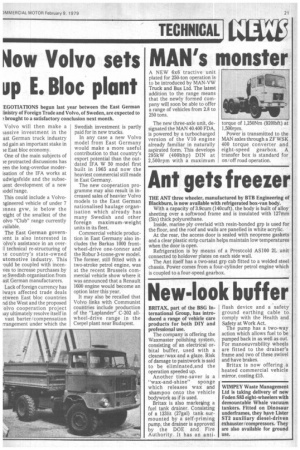Mow Volvo sets up E. Bloc plant
Page 23

If you've noticed an error in this article please click here to report it so we can fix it.
'EGOTIATIONS begun last year between the East German Einistry of Foreign Trade and Volvo, of Sweden, are expected to ?, brought to a satisfactory conclusion next month.
Volvo will then make a lassive investment in the ast German truck industry nd gain an important stake in le East bloc economy.
One of the main subjects of le protracted discussions has een the long-overdue moderisation of the IFA works at udwigsfelde and the subseuent development of a new lodel'range.
This could include a Volvovineered vehicle of under 7 )nnes gvw, ie below the 'eight of the smallest of the olvo "Club" range currently The East German governlent is also interested in 'olvo's assistance in an over II re-structuring of le country's state-owned utomotive industry. This rould be coupled with incenves to increase purchases by le Swedish organisation from ast German manufacturers. Lack of foreign currency has lways affected trade deals etween East bloc countries rid the West and the proposed 'olvo cooperation project lay ultimately resolve itself in vast barter/compensation rrangement under which the Swedish investment is partly paid for in new trucks.
In any case a new Volvo model from East Germany would make a more useful contribution to that country's export potential than the outdated IFA W 50 model first built in 1965 and now the heaviest commercial still made in East Germany.
The new cooperation programme may also result in increased sales of heavier Volvo models to the East German nationalised haulage organisation which already has many Swedish and other foreign maximum-weight units in its fleet.
Commercial vehicle production in East Germany also includes the Barkas 1000 frontwheel-drive one-tonner and the Robur 3-tonne-gvw model. The former, still fitted with a two-stroke petrol engine, was at the recent Brussels commercial vehicle show where it was announced that a Renault 1600 engine would become an option later this year.
It may also be recalled that Volvo links with Communist countries include production of the "Laplander" C-202 allwheel-drive range in the Csepel plant near Budapest.




































































































